Add These Tasty, Low-Carb Vegetables to Your Plate ASAP
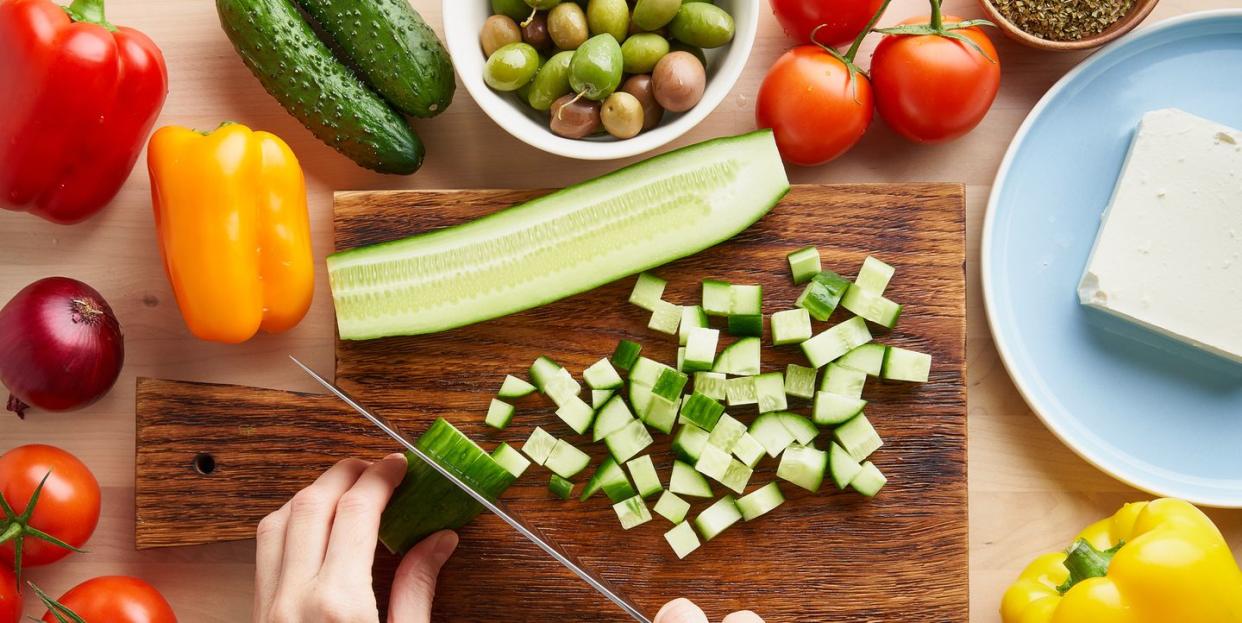
"Hearst Magazines and Yahoo may earn commission or revenue on some items through these links."
Whether you follow a keto diet, a low-carb diet for weight loss, or just feel better cutting down on carbs (though we’d recommend avoiding a no-carb diet!), there are so many reasons someone may choose to follow a low-carb diet. When planning your low-carb snacks and low-carb meals, it’s essential to pack in the best low-carb vegetables for the most satiety, fiber, and nutrients. We chatted with experts to see what best low-carb vegetables you can add to your diet, stat.
What are low-carb vegetables?
There are three types of vegetables we usually refer to when talking low-carb, says Lauren Harris-Pincus, M.S., R.D.N., author of The Everything Easy Pre-Diabetes Cookbook and owner of Nutrition Starring YOU. Low-carb veggies are non-starchy, like kale, spinach, and cucumbers, higher-carb veggies are starchy vegetables that have a higher calorie level, like corn, peas, and potatoes, and then there are somewhere in between vegetables, like root veggies and winter squash, which are lower in carbs than the higher-carb vegetables. But, she says it’s important to remember that all vegetables provide really great nutrition and can have a place in your diet.
“The vegetables we typically refer to as low-carb are non-starchy vegetables. They’re high in vitamins, minerals, and fiber, without excess calories,” adds Mary Ellen Phipps, M.P.H., R.D.N., L.D., author of The Easy Diabetes Desserts Cookbook.
She advocates incorporating low-carb vegetables into your diet to “fill that vegetable component” of your meals for a balanced plate and to add extra fiber into your day. After all, every good low-carb diet also incorporates high-fiber foods.
When in doubt about whether a veggie is low-carb or not, look above the ground. “Vegetables growing above ground are usually low carb,” says Catherine Canadeo, board certified holistic health practitioner and the president and CEO of Catherine Canadeo Health & Wellness. “Vegetables growing below ground contain more carbs, especially potatoes.”
And though experts helped us put together a list of the best low-carb veggies, Harris-Pincus says, the most important thing to understand is that any vegetable is a good thing. Phipps adds that simply finding the vegetables that bring the best flavor and texture based on your preferences is a great goal to have. Here, they share their favorite low-carb veggies to try.
Bell peppers
Phipps says bell peppers are super versatile and can be found year-round. She loves them raw with dip, stir-fried with other veggies and protein, or incorporated into sauces. About a half cup of chopped red bell peppers (100 grams) contains only 7 grams of carbohydrates.
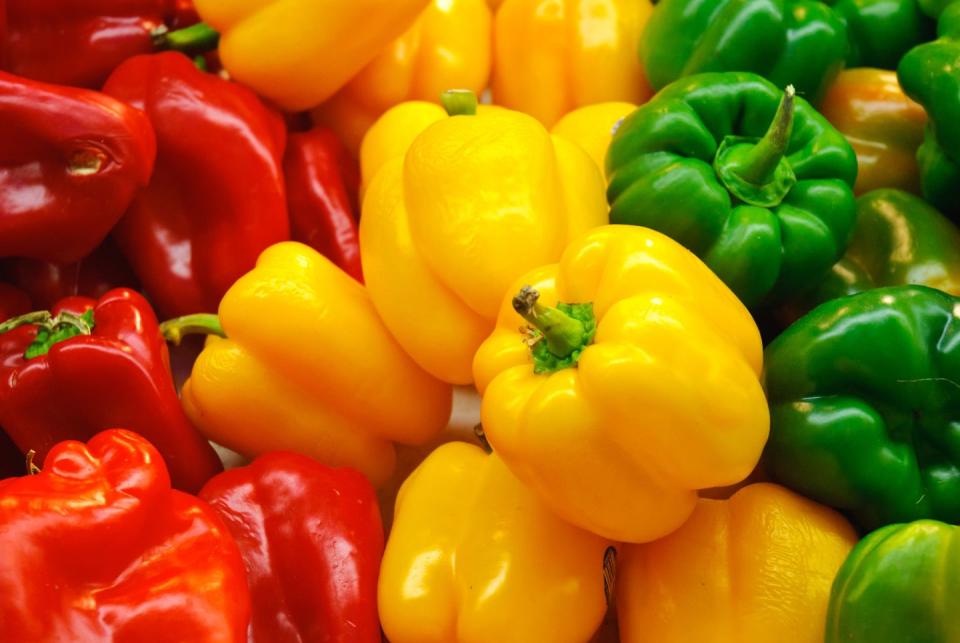
Mushrooms
Though technically, not a vegetable, mushrooms can be incorporated into sandwiches, tacos, and meat mixtures to seriously up your plant-based component, Phipps suggests. About a half cup of chopped crimini mushrooms (100 grams) has just 4 grams of carbohydrates and also offers cancer-fighting properties.
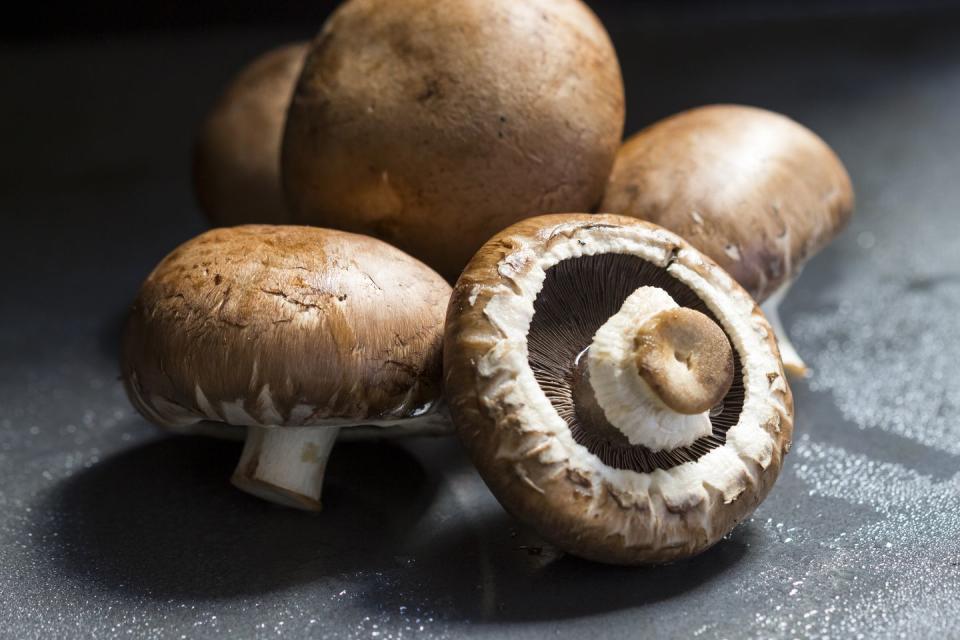
Broccoli
Broccoli is a cruciferous vegetable, which means it’s loaded with fiber and may even lower your risk of cancer. Just one cup of broccoli, for example, has five grams of carbohydrates, and cauliflower is packed with fiber, choline, vitamin K, and antioxidants like vitamin C.
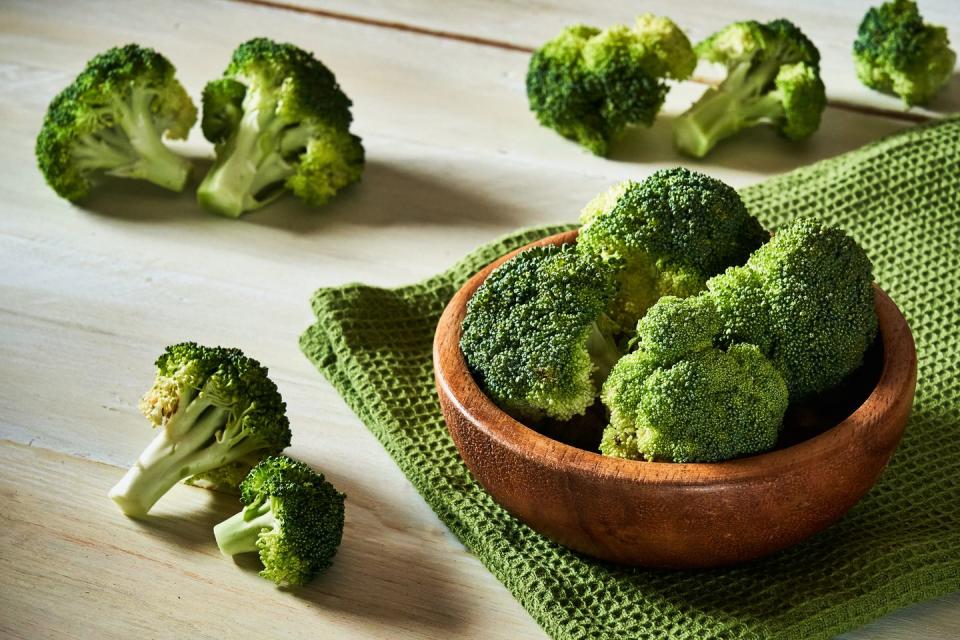
Leafy greens
Romaine, spinach, kale, collards, and more–these leafy greens are a great way to get a higher nutrient content with very little carbohydrates, Phipps says. Just one cup of kale, for example, has one 1 gram of carbohydrates along with fiber, vitamin C, folate, and B vitamins.
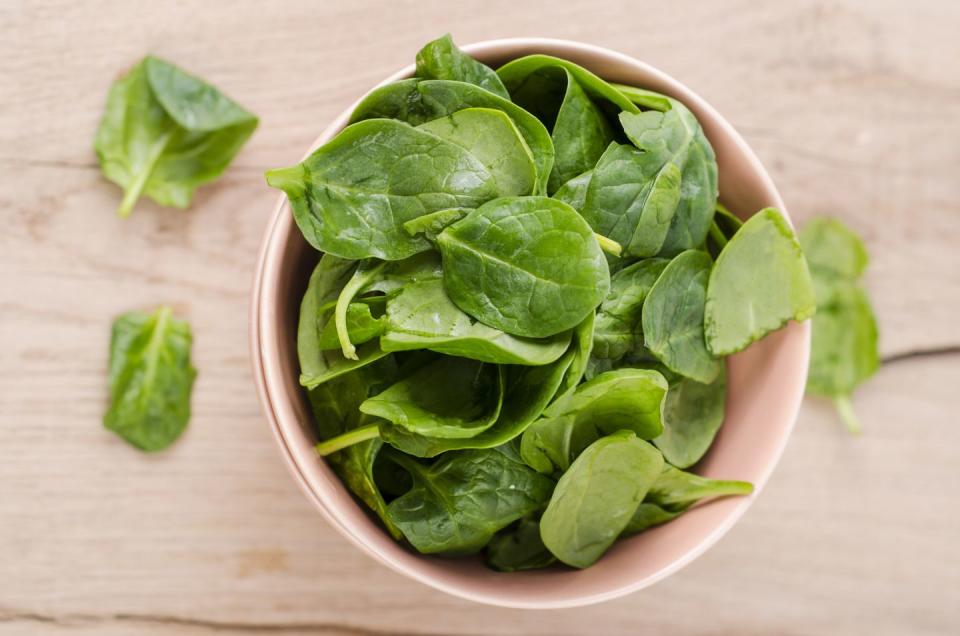
Avocado
We know avocados are a fruit, but Phipps thought they deserved an honorable mention on the best low-carb list because they’re high in fat, but offer a significant source of fiber with few carbs. “They’re great to help you feel satisfied and add palatability and fat, she notes. Just one-half of an avocado has 6 grams of carbohydrates. Try them as a classic avocado toast or even in sweet settings, like this Avocado Mousse.
“[Avocados are] not just low-carb, but are high in fat with 60% of this being monounsaturated fats, which research suggests helps to protect against heart disease and lower blood pressure,” Canadeo says. “They are also an excellent source of information potassium, folate, and fiber, all of which benefit the heart and cardiovascular system.” Try them as a classic avocado toast or even in sweet settings, like this Avocado Mousse.
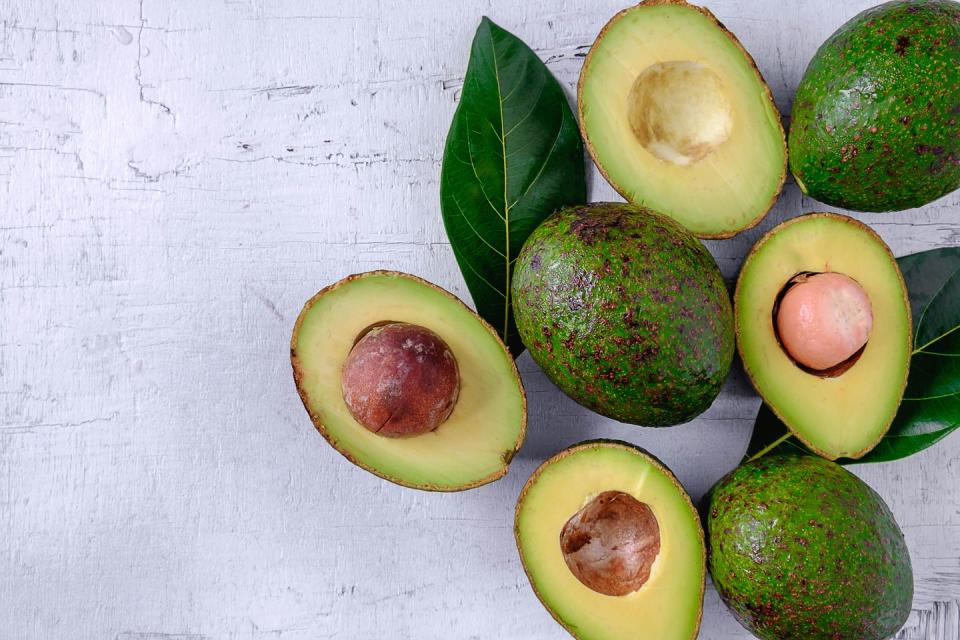
Zucchini
Harris-Pincus says blending frozen zucchini into a smoothie adds great, creamy texture and fiber, and you won’t even notice it. After all, one medium zucchini contains 6 grams of carbohydrates, plus vitamin A, vitamin C, potassium, magnesium, and much more. Try one of these healthy zucchini recipes.
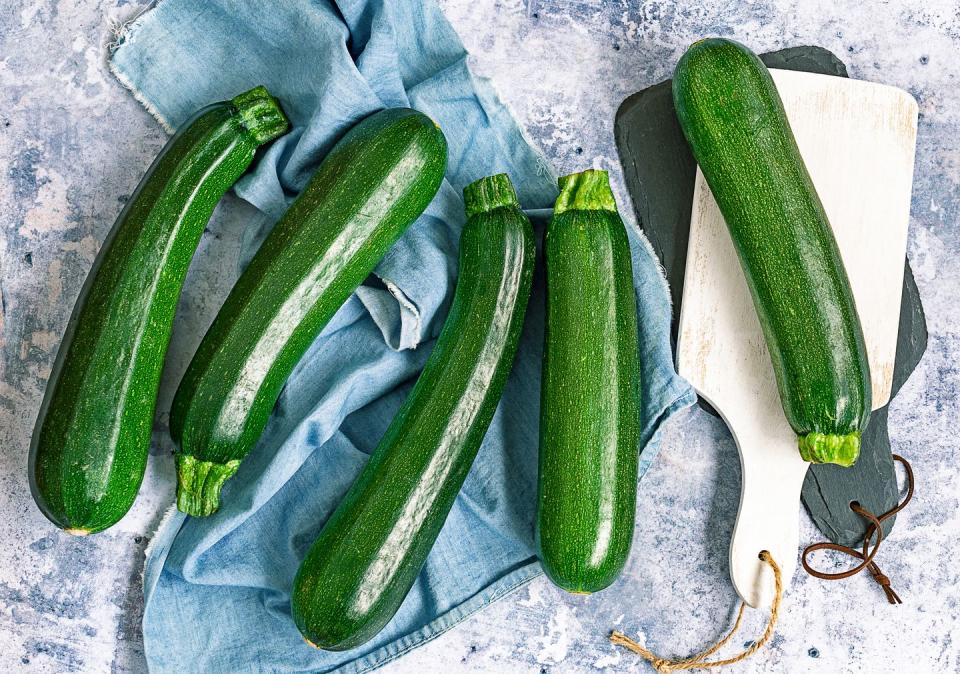
Cucumbers
A half-cup of cucumber slices has less than 2 grams of carbohydrates. You can slice them into salads or even blend them into a Honeydew-Cucumber Slushie for a sweet treat.
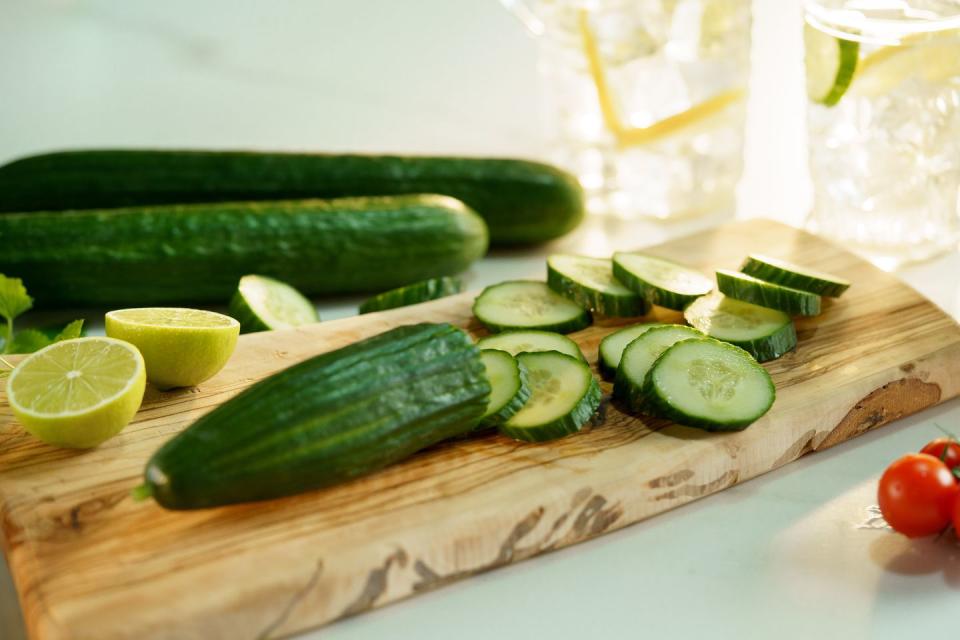
Green beans
A simple Green Beans With Almond Gremolata may just be our go-to side dish. After all, a cup of green beans has about 5 grams of carbohydrates.
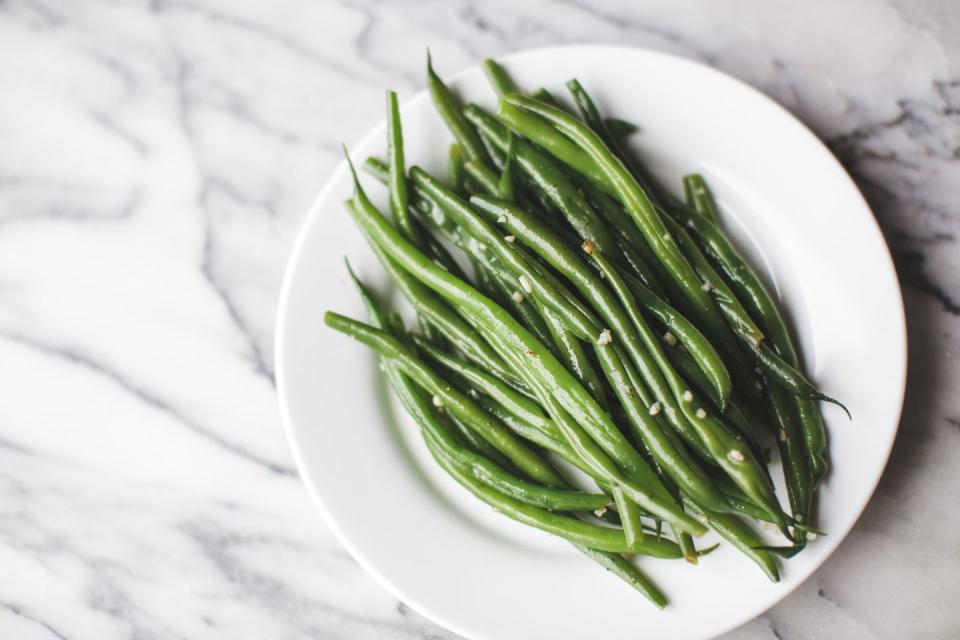
Asparagus
These spring veggies are perfect simply boiled or roasted. Canadeo recommends asparagus because it contains vitamins C, K, and A. “You’ll gain many healthy benefits including more energy, the ability to fight off disease, a boost in metabolism, and proper functioning of many bodily systems,” Canadeo says. We love this Sheet Pan Salmon & Asparagus or these Pickled Asparagus Stems for the remaining bits. A half-cup of boiled asparagus has just 4 grams of carbohydrates.
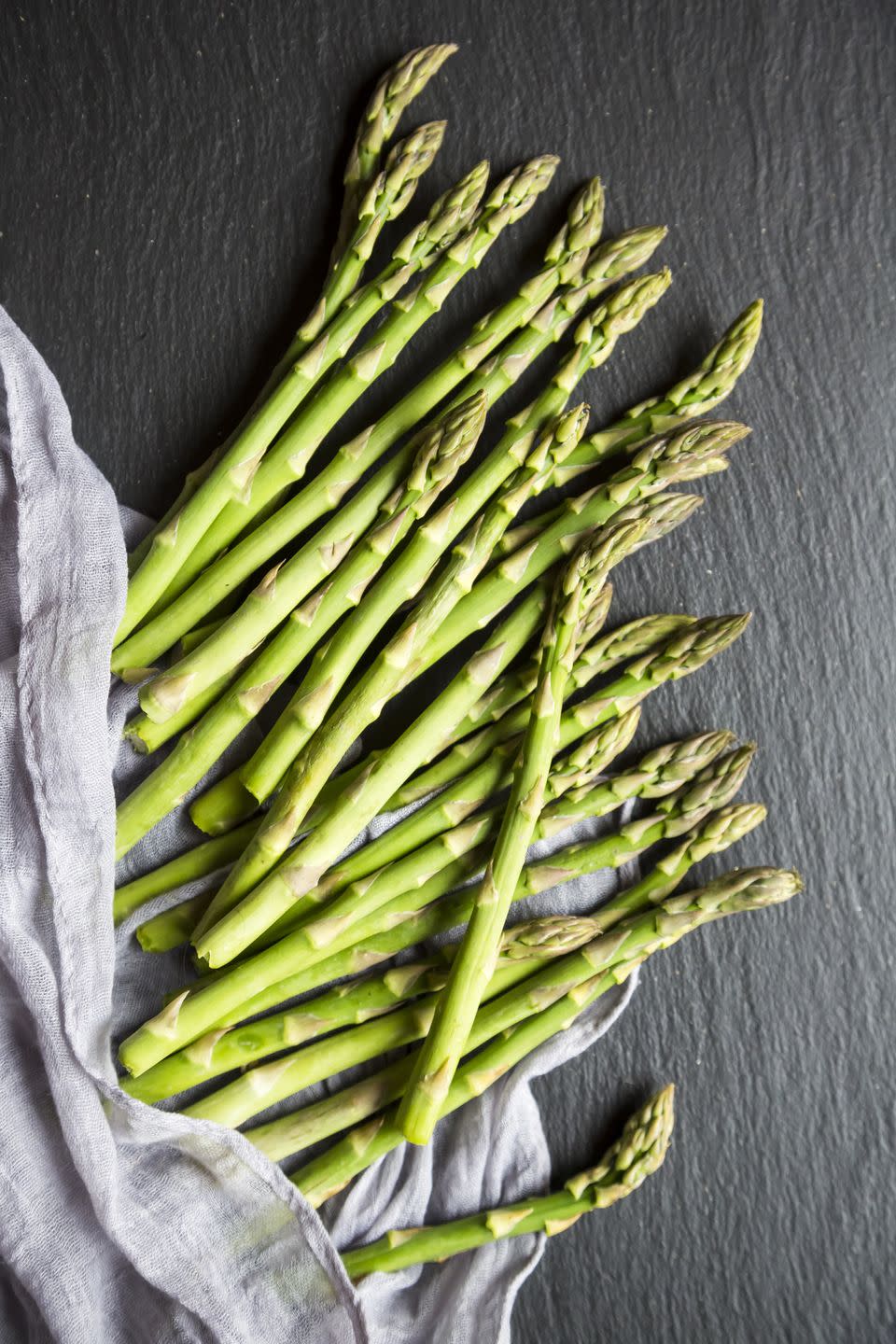
Celery
We know that celery juice has health benefits like vitamin C, B, A, and iron, but the stalk itself can be delicious with nut butter or cooked into a stir fry for dinner. One cup of chopped celery has 3 grams of carbohydrates.
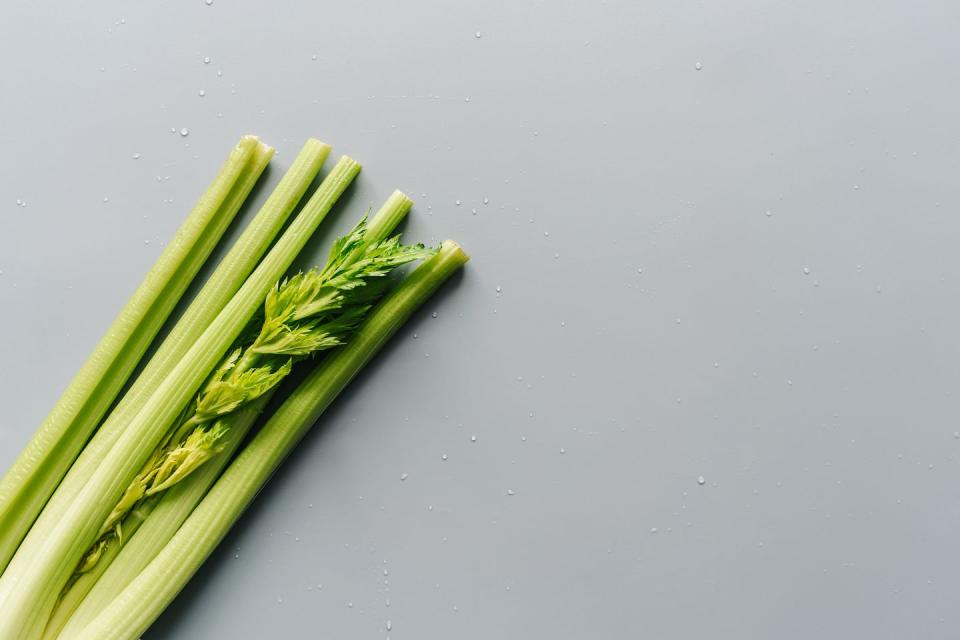
Eggplant
One cup of cooked eggplant has just under 9 grams of carbohydrates, and it’s an incredibly delicious and versatile veg. Try this Spiced Grilled Eggplant With Fresh Tomato Salad for summer on a plate, roast with other veggies in the oven, or even blend cooked eggplant into dips.
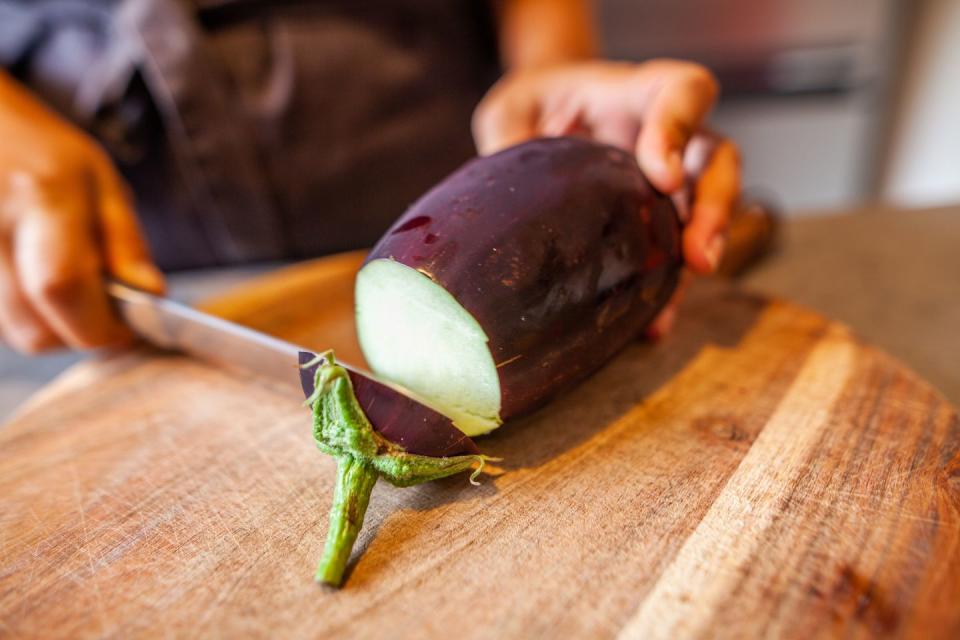
Tomatoes
Tomatoes boast vitamin C, potassium, folate, vitamin K, and plant compounds called lycopene and beta carotene that are good for your overall health. And a half-cup of grape tomatoes has 4 grams of carbohydrates. You can enjoy these veg (technically fruits) raw in salads or on sandwiches, but we love these Roasted Cherry Tomatoes as a side dish.
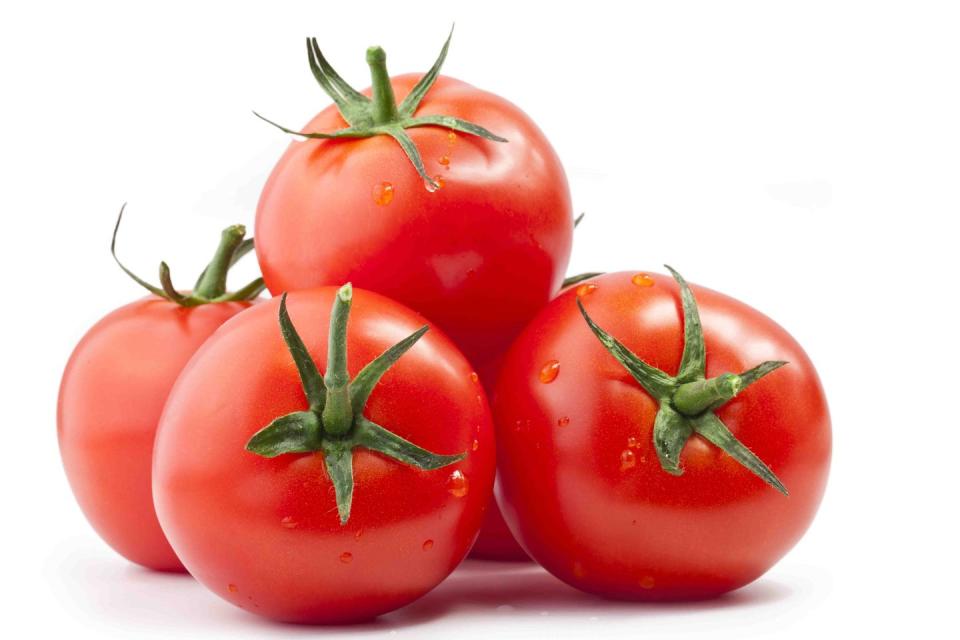
Squash
Mia Syn, M.S., R.D.N., registered dietitian, national on-air nutrition expert, and author of Mostly Plant Based, recommends yellow squash: Just like zucchini, this summer squash is mild in taste which makes it an easy addition smoothie, in addition to stir-fries and pasta dishes. One cup contains five grams of carbohydrates.
If you’re a big pasta-lover, Syn suggests replacing the noodles with spaghetti squash: “You don’t have to give up pasta when following a low-carb diet thanks to this lower carb veggie-based pasta swap,” she says. “Spaghetti squash is similar in taste and texture to spaghetti but with more fiber, vitamins and minerals, and less carbohydrates. One cup serving has nine grams of carbohydrates compared to your average cup of pasta which clocks in at around 40 grams.”
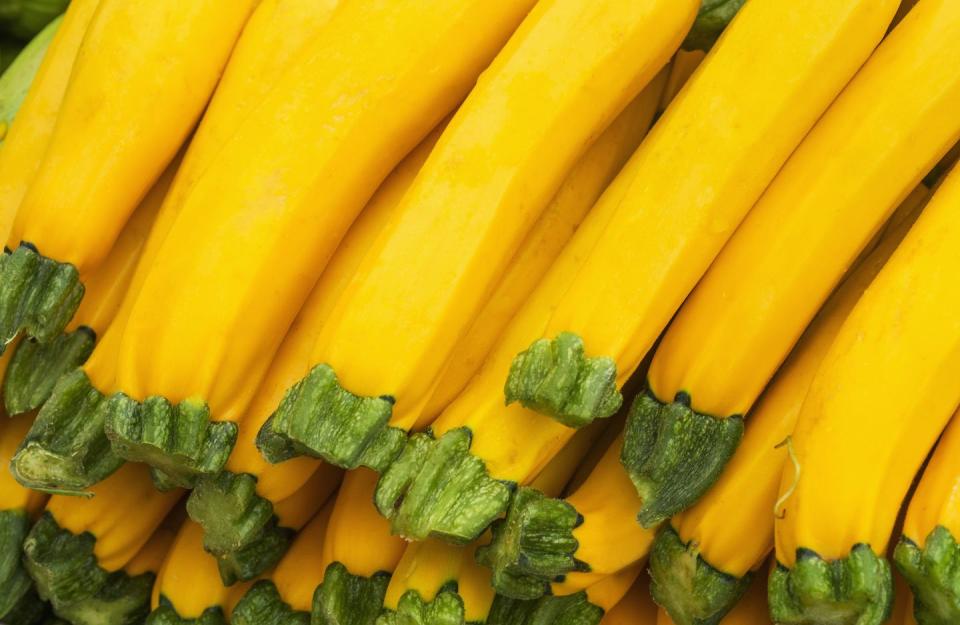
Cauliflower
Cauliflower is broccoli’s cousin, falling under the cruciferous vegetables category. It’s packed with fiber, choline, vitamin K, and antioxidants like vitamin C. 100 grams of cauliflower has only 5 grams of carbohydrates, making it a great (and not to mention, delicious) low-carb veggie option.
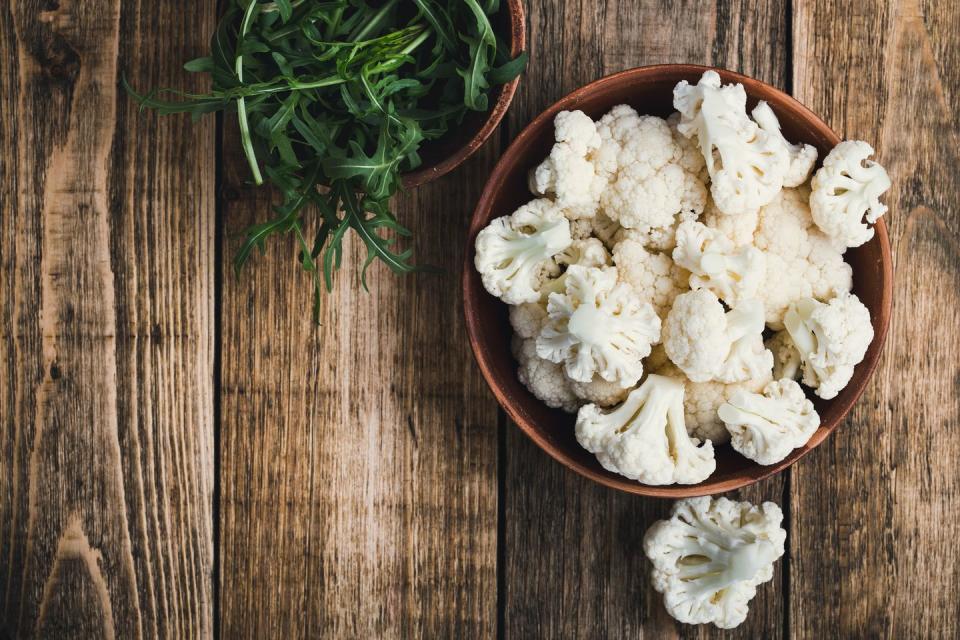
Radishes
“Besides adding a pretty pop of pink to your salads and snack plates, radishes add a dose of vitamin C and fiber to your day,” Syn says. One cup of sliced radishes contains only 4 grams of carbohydrates.
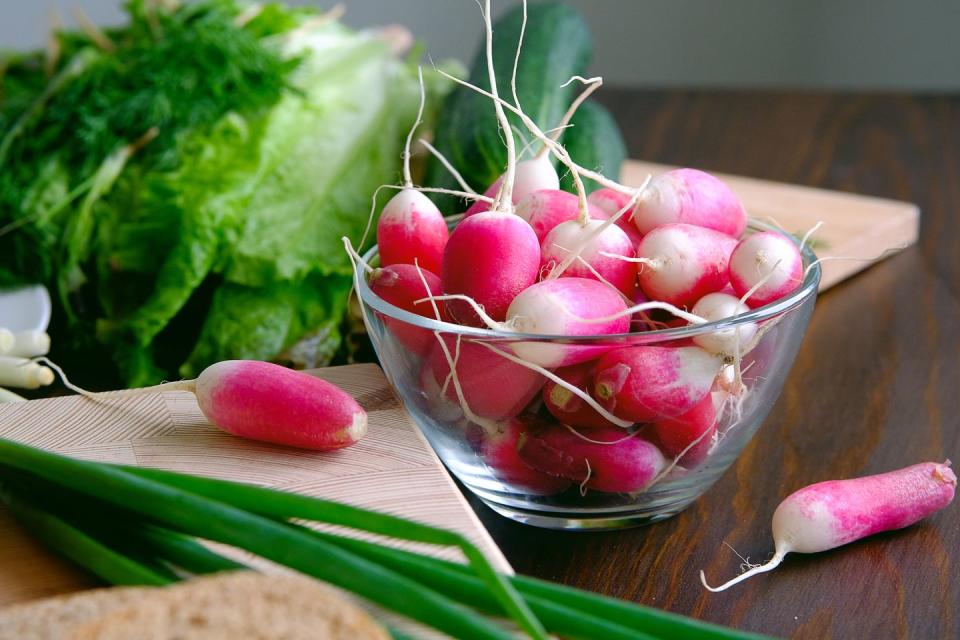
Brussels sprouts
Yet another cruciferous vegetable, one cup of brussels sprouts only has eight grams of carbs and is jam packed with vitamin C. These tiny vegetables have big health benefits, such as anti-inflammatory properties and possibly lowering the risk of cancer. Try this delicious Mustard-Glazed Brussels Sprouts recipe.
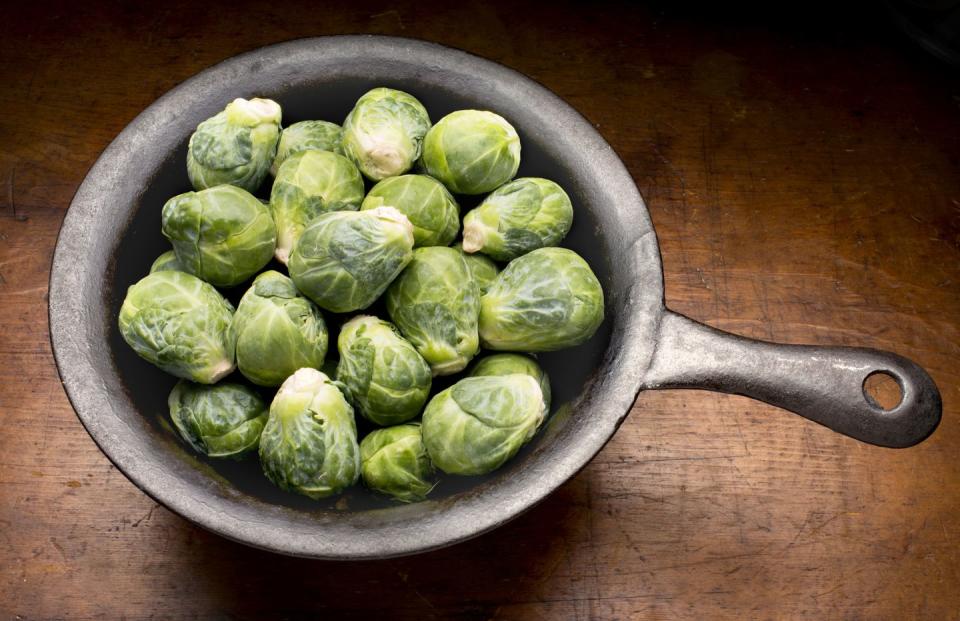
Garlic
If you’re looking to add a punch of flavor to your recipes without increasing the carbs, try adding some garlic. “A little goes a long way when it comes to garlic,” Syn says. “One garlic clove can elevate the flavor of a dish while adding small amounts of vitamins and minerals including vitamin C, zinc, calcium and iron.” The best part: a clove of garlic clocks in at only 1 gram of carbohydrates.
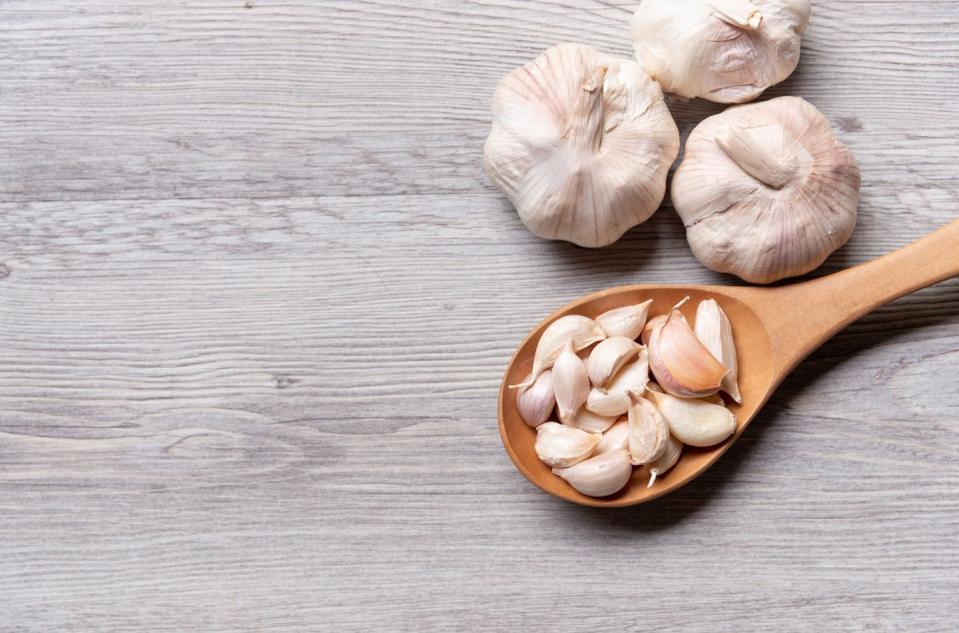
Sugar snap peas
Sugar snap peas is the perfect crunchy snack or addition to stir-fry recipes that Syn recommends. “They provide key nutrients including vitamin C, vitamin K and potassium,” Syn says. “They also have more protein than many other vegetables.” One cup of sugar snap peas has 5 grams of carbohydrates.
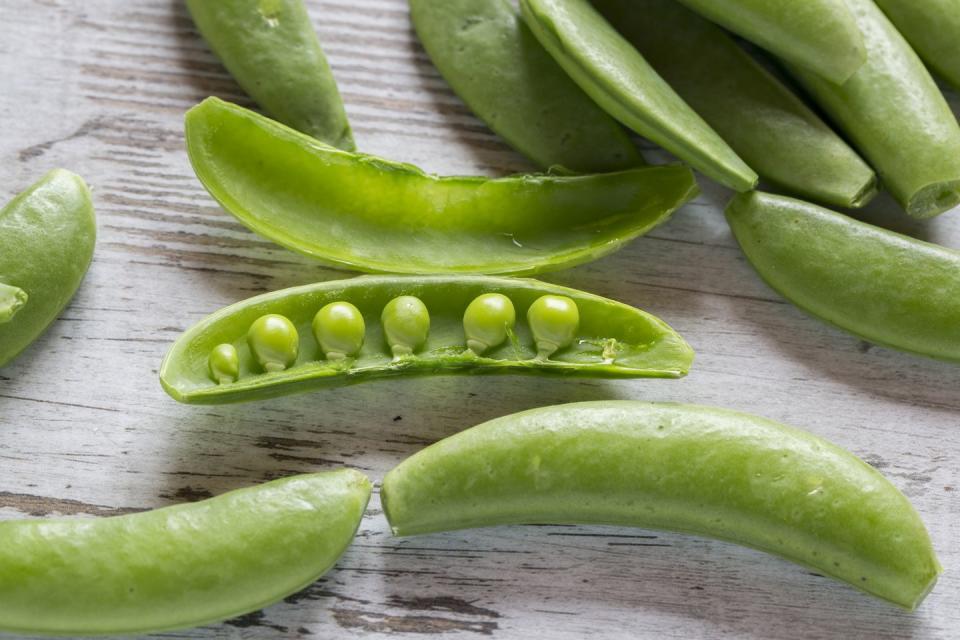
Cabbage
Cabbage is another cruciferous vegetable that Canadeo recommends, which she considers “the most classic and iconic low-carb [vegetable.]” This leafy vegetable is rich in vitamin C and sulforaphane, which are antioxidants that help your body remove free radicals. Free radicals are tiny, toxic particles that damage your body’s healthy cells, and are formed in your body from UV rays, preservatives, and more.
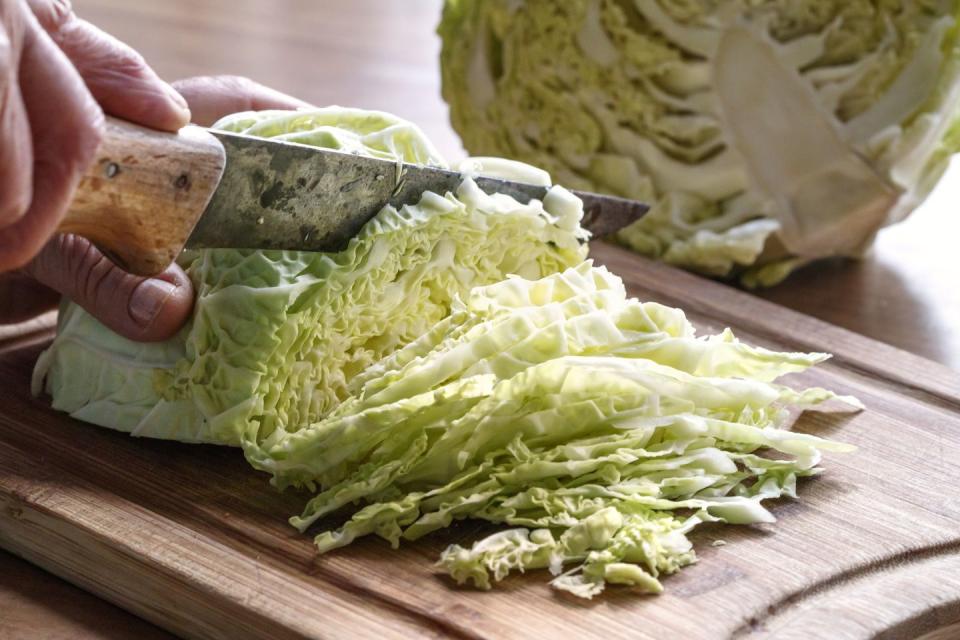
Onions
Onions are high in carbs by weight, but they’re not typically eaten like an apple. A half-cup of sliced raw onions has five grams of carbohydrates, and contains antioxidants and fiber. Try this Balsamic Chicken and Onion Salad recipe for a low-carb lunch, or try adding onions to a Greek Salad for a kick of flavor.
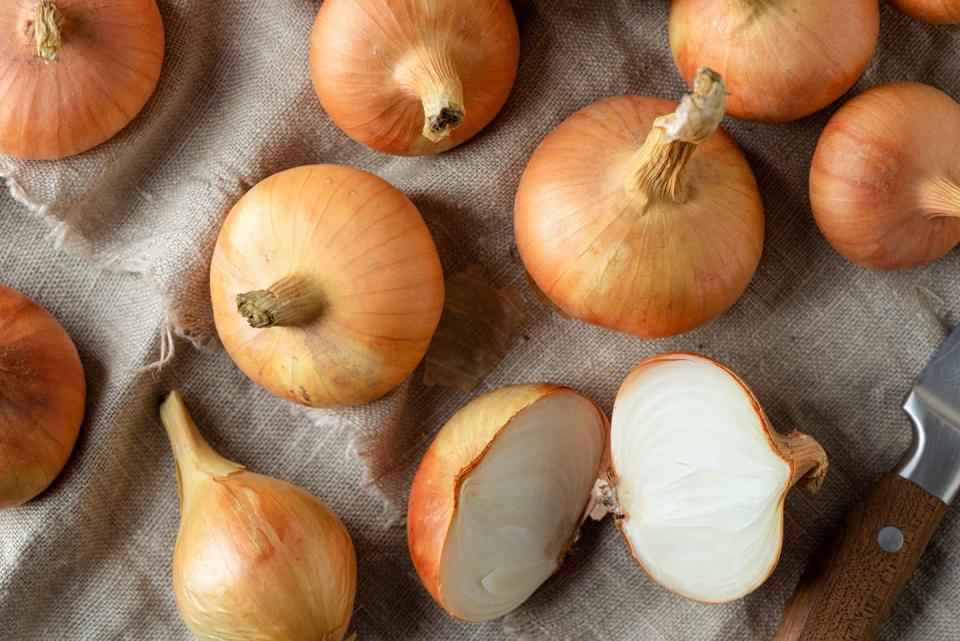
What is a low-carb diet?
A low-carb diet is based on the individual, but typically, the minimum carbohydrates you should have in a day are 130 grams, Phipps says. She encourages anyone looking to follow a low-carb diet to work with their doctor or dietitian to ensure they’re following a realistic and healthy eating plan before trying something new.
When following a low-carb diet, Phipps says finding balance is the main priority. Focus on fiber and protein sources that contribute some form of fat to keep you full and energized. Phipps and Syns warn against consuming too much fat—or bland vegetables and proteins without any fat at all. “When following a low-carb diet, it is important that you are choosing fiber-rich carbohydrates, lean protein and good fats,” Syns says.

What are the benefits of a low-carb diet?
Low-carb diets can help you lose weight because you are consuming less processed sugar and eating less throughout the day because you will feel fuller. “This may be due to the satiating effects of protein and fat, the two other macronutrients of focus on a low-carb diet,” Syn explains. Staying fuller for longer isn’t the only benefit of eating more protein and fats; it can also help lower the risk of type 2 diabetes and heart disease.
If you’re concerned about your heart health, you may want to consider a low-carb diet. “A low-carb diet may also be beneficial for lowering triglycerides and boosting good HDL-cholesterol levels, two markers of heart health,” Syn says.
“Following a low-carb diet can be effective in losing that extra water weight as glycogen stores get utilized and also avoiding blood sugar and insulin spikes,” Canadeo says. Water weight is typically the first weight you lose, and according to Mayo Clinic, low-carb diets are more effective for short-term weight loss rather than a year-long plan. That doesn’t take away from the health benefits of a low-carb diet, but it does mean it might not be a long-term meal plan option.

Is a low-carb diet safe?
Phipps notes that a low-carb diet isn’t something that has to be done long-term. For some, like those who have endometriosis, polycystic ovarian syndrome, or diabetes, a low-carb diet may alleviate some symptoms or make you feel better. If this is the case for you, and you’ve cleared your diet changes with your doctor or registered dietitian, then it’s totally okay to continue following a low-carb diet.
A sudden decrease in carbohydrate intake can cause short-term issues, such as constipation, headaches, and muscle cramps. If you severely limit the amount of carbohydrates in your diet, your body can enter a state of ketosis. This is when your body does not have enough glucose for energy, so it begins breaking down fat into ketones for energy. The “keto diet” gained popularity for reducing fat, but it can also cause bad breath, fatigue, low bone density, high cholesterol, and headaches. Always consult your doctor before starting any new diets, and it’s best to avoid any drastic changes. Instead, try lowering the amount of carbs you eat over the course of a few weeks.

You Might Also Like

